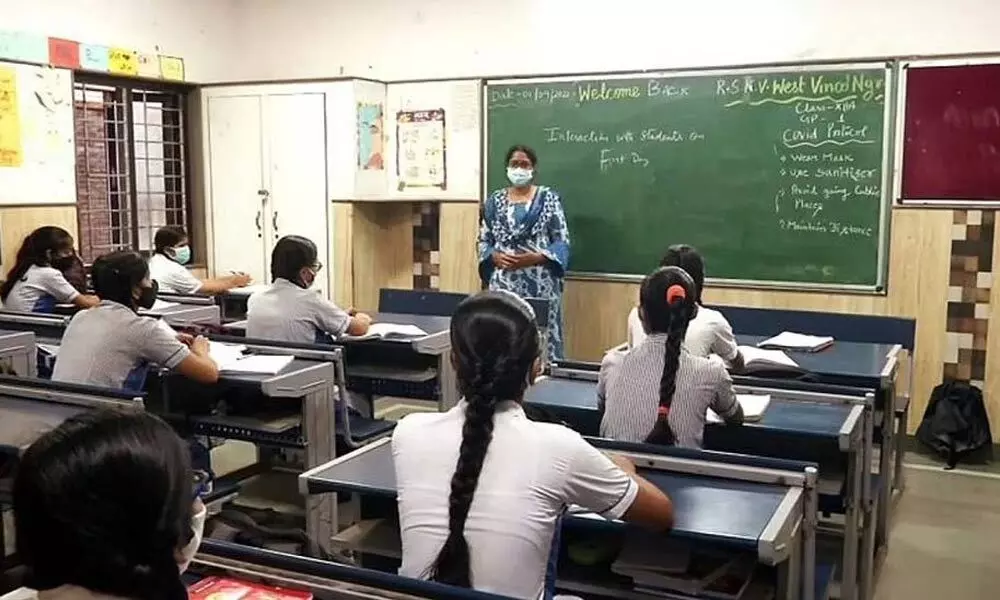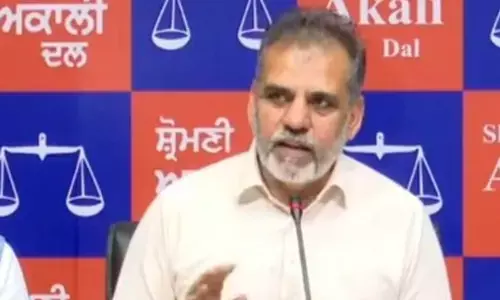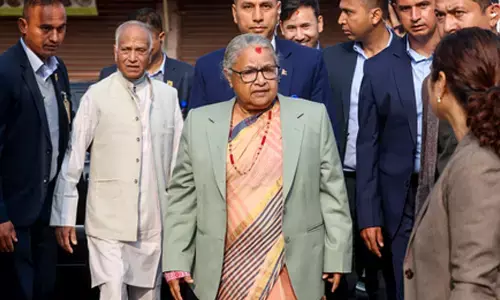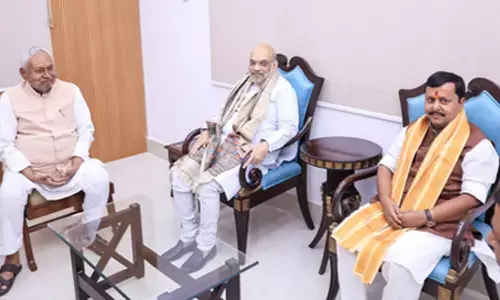Digitalisation of Education enthuses experts

Digitalisation of Education enthuses experts
The budgetary allocation this year emphasises on the needs of skilling, reskilling and upskilling citizens.
The budgetary allocation this year emphasises on the needs of skilling, reskilling and upskilling citizens. Considering the situation of the last couple of years which greatly impacted the job pool and led to declining job opportunities leaving the employable workforce jobless, this years' union budget focused on creating 60 lakhs jobs. Hence, by prioritising skilling and reorienting skilling programmes the government will give an immense boost to the youth of the country to get back to work. I wish the government had definitive plans to accomplish the same and even encourage such platforms that work towards skilling from the perspective of employability and create business models on successful employment."
— Narayan Mahadevan, Founder, BridgeLabz
Path-breaking initiatives such as digital Desh e-portal, digital university and e-content portal for teachers serve to provide comfort on the acceptance of EdTech by the government and the regulatory bodies. We are pleased with the way Budget 2022 has focused on leveraging technology to drive deeper penetration into the market and breaking barriers to provide access to top-quality education to the masses. We expect EdTech businesses catering to customers in the Tier-II and lower cities to gain significant momentum in the coming years. Education is one of the key pillars of growth and youth upskilling is a major contributing factor. With technology playing a key role in the growth of various sectors, the availability of a skilled workforce will be critical.
— Nikhil Barshikar, Founder and MD of Imarticus Learning
As per the budget announcement by the FM, there will be the creation of 60 lac new jobs. Using a capital investment approach to do so and not making any alterations would work considering how well the corporate sector is doing. Taking into account the last two years of the pandemic which has been difficult for all, there wasn't much for the salaried class/middle class. However, if I must say so, the goal is to improve things through infrastructure investment and by not putting money directly in the hands of the consumers. Introducing Desh Stack e-portal should be a help in creating and stimulating the environment for skill development. In the last year's budget NAPS was the fourth pillar and now, announcing Desh Stack is a step in the right direction."
— Sidharth Agarwal, Director, Spectrum Talent Management
Two important points on education are worth highlighting in the Union Budget. First is the digital infrastructure: due to the Covid-19 pandemic outbreak, the whole education system had to shift online. Teaching every child was the biggest challenge any school could face. Through one class, one channel, it will become much easier to reach every child. Second is the up-gradation of Anganwadis: they are usually taken as daycare centres, but it is a base for any education system. Equal importance should be given to early childhood education as well. That said, the implementation of these measures should be effective and time-bound.
— Dr Maithili Tambe, CEO, The Academy School, Maharashtra
Right from the Finance Minister's use of a tablet to propose the budget explained that India is on the path of a digital revolution in the near future. As expected the government has well thought to reduce the digital learning gap between the urban and rural by introducing '1-Class-1-TV channel" covering multiple regional languages, which will not only counter the learning losses but will bridge the learning gap. The PM's e-Vidya will be further expanded from 12 to 200 channels to facilitate supplementary learning. For the implementation of NEP 2020 great stress is implied on shifting the focus on Upskilling, therefore the launch of Digital DESH e-portal for skilling, upskilling and reskilling will be the key to newer dynamics.
— Dr Silpi Sahoo, Chairperson, SAI International Education Group
Increased focus on delivering education in regional languages will help improve learning outcomes by overcoming the language barrier. The pandemic has brought out the need of using technology to curate content to individually fit students' learning needs and the government's focus on delivering personalised learning at the doorstep is a step towards that. Increased focus on technical skills in ITIs will help promote the employability of students and further put India on the world map as the hub of engineering excellence. In addition to this, the opening of a digital university will not only improve access towards higher education learning in India, it will also improve access of international students to Indian education.
—Dr Sridhar G, Founder, Deeksha
The second paperless budget at a time of India's recovery from the pandemic is neither too populist nor a big bang. The budget focuses on infrastructure spending, thrust on investments, and Capex outlay. This is great because it could further fuel demand. The additional infusion of funds to CGTMSE and extension of ECLGS to March 2023 will be helpful for the MSME segment. It is encouraging to see the announcement on central bank digital currency using blockchain as it will further reduce dependency on cash and could potentially give significant impetus to the digital payments ecosystem. The announcements concerning the focus on digital banking are also encouraging.
— Srividya Kannan, Founder, Director, Avaali Solutions Pvt Ltd.
The Union Budget 2022 has accorded the much-needed importance on digital education and also on enhancing skilling programmes. It is heartening to learn that the finance minister emphasised the National Skill Qualification Framework. The skilling initiative announced in the budget will explore the untapped potential amongst the Indian youth, boosting their employability with dynamic industry needs. Training teachers to use better in teaching outcomes and equip them with necessary skills is the Need of the Hour. The Digital Ecosystem for Skilling & Livelihood e-portal provides ease for students to enable the discovery of relevant jobs, entrepreneurial opportunities among citizens.
— P C Chhabra- Executive Director, Sanskriti University
I believe announcements around National Digital Health Ecosystem in the Union Budget 2022 are a positive step towards digitization of health records and making data exchange & analysis easier both for providers as well as patients. If implemented well can certainly lead to efficiencies in diagnosis & treatment. Digital health ecosystem can further improve access to quality yet affordable healthcare for citizens. Further, National Tele Mental Healthcare Program is rare mention in the budget and thus, recognizes importance of mental health in India. Mental wellbeing has been a taboo subject in our country, this digital platform can greatly help mainstreaming mental health alongside physical wellness and will make medical help available to patients at the right time.
— Anurag Khosla, CEO, Health by Aetna
The Union Budget 2022 gives confidence to the business community as it focuses on building strategic strengths rather than taking short term and fiscally deviant populist measures. The FM has avoided giving in to the pressure of the upcoming assembly elections.
Digital inclusiveness for citizens of all classes, increased capital expenditure on infrastructure, push for logistics betterment with continued development of railways and highways, boost to the EV industry with standardized norms for battery swapping, charging and leasing, and easing the compliance burdens are the measures that are essential for business growth in India.
— Ravi Saxena, Co-Founder & MD, Wonderchef
The main thing that makes us happy as a design university in the new budget is that it focuses on animation, gaming, visual effects and comics and talks about promoting This sector. We recognized this need 4 years ago and implemented these courses in our university. It is a matter of delight that provision has been made in the new budget to promote these sectors by understanding their potential. Another point is that the budget announcement has recognized the need for urban planning and urged AICTE to focus on it. It is a matter of happiness because the way urbanization is increasing in the country, it is paramount to recognize the need of urban planning. Being a design university, we understand this need, so we have also prepared graduates in this sector through courses in architecture and city planning.
— Sanjay Gupta (Vice Chancellor, World University of Design)
The Union Budget 2022 announced, was a hit and miss for the education sector. While it has finally addressed and recognised the learning loss the pandemic has created, the need to develop the digital infrastructure of the country was not adequately focused on the budget. The economically disadvantaged students especially in rural areas have lost essential years of education and the introduction of supplementary teachers was highly necessary. Supplementary education can help bridge the gap to a large extent. The increase of 'One Class One TV Channel' from 12 to 200 TV Channels to provide supplementary education in regional languages for classes 1-12 is a welcome move but it will not be enough.
— Dr Mona Lisa Bal, Chairperson, KiiT International School
The Union Budget 2022 for education is a continuum for potential GDP growth over the next 25 years and it's a sign of relief that reflects good governance. Digital DESH, Digital University initiative, One-Class-One channel through PM eVidya for supplementary education in regional languages for rural development and finally with fibre optic connectivity for last-mile digital reach in villages are indeed progressive initiatives. PPP (Public Private Partnerships) with Hub-N-Spoke models for EdTech companies will certainly harmonize better learning outcomes, especially on world-class student skill development. Setting up of 5 COE (Center of Excellence) is a catalyst to excellence in education on the world stage.
— Osborne Dsouza, Director & CEO, Edufiq, EdTech
We are glad to see the government taking progressive steps in the direction of universal education. The Union Government has taken the learning losses caused by Covid-19 into cognisance. This is reflected in the 16% increase in overall outlay for School Education and 25% increase in the allocation for Samagra Shiksha Abhiyan (SSA). The focus on multi-lingual dissemination of digital education in the budget is heartening. We look forward to hearing more on the competitive framework for development of high-quality e-content.Local access to good schooling and quality teachers supported by excellent digital content will significantly increase the impact of education on students' futures.
— Puneet K, President, The Narayana Group
The education sector was one of the most impacted sectors because of the pandemic and we were expecting support from the Government. We were expecting flexible and low-interest education loans which is the same as before but we are happy with the PM eVidya Scheme and the launch of Digital University. E Green University, One Class One TV Channel, Digital University is a good step towards digital India and training teachers to use better in teaching outcomes was a necessary step. 5 Centres of Excellence to be set with an endowment fund of Rs. 250 crore each for Urban Planning courses that would assist in Urban Sector Development, encouragement of academic Institutes and Research and Development will be supported for the ambit of Defence Budget.
— Dr Latika Chaudhary, Associate Dean - Outreach & Operations, The Design Village (TDV)
FM Nirmala Sitharaman in her Budget 2022 speech laid impetus on the importance of digital education and announced a host of measures for the Covid-19 pandemic-hit education sector. ITIs will realign the vocational courses as per the industry requirements. Focus on developing skills in modern-day technology like Artificial Intelligence etc will help in coping up with industry demand. 23 National Tele mental health centres is a good initiative towards the awareness of mental health, will help people to recover from stress and anxiety due to the Pandemic and lockdowns.
— Dr Mukesh Kwatra, Founder Smiling Tree
Very intrigued to know about the setting up of the digital university and the AVGC task force that the government has announced in the budget. The budget certainly looks to be forward-looking and promising as the AVGC (Animation, Visual Effects, Gaming and Comics) industry in India happens to be worth about 40 billion dollars today and would be growing to about 60-70 billion dollars by 2027/28. This is a very welcoming step keeping in mind the growth in the AVGC industry, augmenting global demands for quality content and the current resource crunch of trained and skilled individuals. We sincerely look forward to seeing an ecosystem being developed for the same. ''
— Dr Manoj Singh, CEO, RUBIKA India
The union budget has ushered in positive measures in the field of education which will give a boost to the sector especially in the context of the pandemic. A robust education system is a necessity for any growing nation and this is all the more important when the country is aiming to normalize education. The focus on digitization, bridging the rural-urban gap, making online education available to all children are all measures that are welcome. Two years of education regression for school going children meant that we needed to double-up efforts to bridge education gaps. The budget 2022 for the education sector rightly focuses on upskilling and digital learning. The announcement of one class one channel and expansion to 200 channels under e-vidya will enable the reach of online education to a vast body of students where online education is still not widespread.
— Shweta Sastri, Managing Director, Canadian International School, Bangalore
Education is a unique sector where investment has multiple effects. The State of education is often a healthy predictor of the country's overall development and well-being. While quality education holds the key to inclusive growth, education in India needs to be recognised as an equaliser especially in the context of the pandemic. It is also a crucial instrument that can bridge the socio-economic divide in our country. Establishing a Digital university and over 200 channels covering multiple regional languages under the One class, one TV channel' program are two very innovative and path-breaking initiatives that will enable students across the country to access quality education far and wide through the hub and spoke model.
— Niru Agarwal, Trustee, Greenwood High International School
Union Budget 2022 has given the education system to nourish all the children while sitting at home in this Covid-19 era, launching of eVidya for school children will bridge the education gap. This will make the education sector back to work again through digital learning and the establishment of a digital university, giving students an opportunity towards skill development as well. The launch of the digital university under the PM scheme will make the young generation access world-class quality education and this will make students make their careers stronger and better. The skill development programme will help our youth to enhance their skills and make their name in their field.
– Dr Neelima Kamrah, Principal of KIIT World School, Gurugram
The State of education is often a healthy predictor of the country's overall development and well-being. Quality education holds the key to inclusive growth and education in India needs to be recognised as an equalizer especially in the context of the pandemic. This year's budget will bring a revolutionary change to the education sector as it can support the capacity building of teachers and school leaders across the country. Investing in teacher education through the training of teacher educators and implementation of robust institutions for teacher training and education will create a high-quality education system in the country. Education is also a crucial instrument that can bridge the socio-economic divide in our country.
— Dr Tristha Ramamurthy, Founder & Managing Director, Ekya Schools, and Provost, CMR University.
As the budget encourages skills development &and digitization. Reskilling and Upskilling will be key to getting students ready for digital jobs. Global trends suggest the evolution of the creator's economy. Soloprenurship and freelancing will be a big trend in the future. Digital and creators' skills can uplift many young job seekers and get them ready to be meaningfully employed without leaving their cities or villages. We need to focus on workplace experiences along with skilling, re-skilling and upskilling. This will drive the creators economy in India."
— Manav Subodh, Managing Director, 1M1B (One Million for one Billion)









